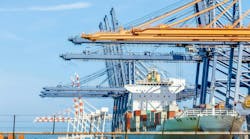Confidence in the equipment finance market is up, according to the Equipment Leasing & Finance Foundation’s latest Monthly Confidence Index. The July reading was 59.4, an increase from the June index of 57.3. This reflects industry participants’ increasing optimism despite continued moderate demand for equipment, say key executives from the $725 billion equipment finance sector.
“Demand for replacement/additions of equipment and facilities remains steady to increasing, with rising interest rates and equipment costs accelerating capital expenditures through the remainder of 2013,” said Russell Nelson, president, CoBank Farm Credit Leasing. “We have growing confidence that the economy and business climate will continue to post modest improvement during the next 18 months.”
When asked to assess their business conditions over the next four months, 25% of executives responding said they believe business conditions will improve over the next four months, up from 19.4% in June. 71.9% of respondents believe business conditions will remain the same over the next four months, up from 71% in June. 3.1% believe business conditions will worsen, down from 9.7% the previous month.
15.6% of survey respondents believe demand for leases and loans to fund capital expenditures (capex) will increase over the next four months, down from 19.4% in June. 81.3% believe demand will “remain the same” during the same four-month time period, up from 71% the previous month. 3.1% believe demand will decline, down from 9.7% in June.
21.9% of executives expect more access to capital to fund equipment acquisitions over the next four months, up from 19.4% in June. 78.1% of survey respondents indicate they expect the “same” access to capital to fund business, a decrease from 80.6% the previous month. No one expects “less” access to capital, unchanged from June.
When asked, 25% of the executives reported they expect to hire more employees over the next four months, a decrease from 29% in June. 68.8% expect no change in headcount over the next four months, up from 67.7% last month. 6.3% expect fewer employees, up from 3.2% of respondents who expected fewer employees in June.
90.6% of the leadership evaluates the current U.S. economy as “fair,” unchanged from last month. 9.4% rate it as “poor,” also unchanged from June.
34.4% of survey respondents believe that U.S. economic conditions will get “better” over the next six months, an increase from 22.6% in June. 62.5% of survey respondents indicate they believe the U.S. economy will “stay the same” over the next six months, a decrease from 71% in June. 3.1% believe economic conditions in the U.S. will worsen over the next six months, a decrease from 6.5% who believed so last month.
In July, 31.3% of respondents indicate they believe their company will increase spending on business development activities during the next six months, an increase from 25.8% in June. 68.8% believe there will be “no change” in business development spending, a decrease from 74.2% last month. No one believes there will be a decrease in spending, unchanged from June.
Comments from Executive Leadership:
Independent, Small Ticket:
“I feel confident about the future of our resilient industry. However I am concerned about the overall decreasing margins and lackluster demand that has yet to indicate a strong level of optimism from the small business sector. If delinquency increases to any great degree decreased profitability may limit future underwriting capabilities and availability of capital.—Valerie Hayes Jester, president, Brandywine Capital Associates, Inc.
Bank, Middle Ticket:
“With a potentially improving economic environment and a rising rate environment, demand for equipment financing could be very strong in the second half of 2013.” —Thomas Jaschik, president, BB&T Equipment Finance
Independent, Middle Ticket:
“Our feeling is tentative. There appears to be a fairly liquid market, but demand is not very robust.”—George Booth, managing director, Black Rock Capital, LLC


